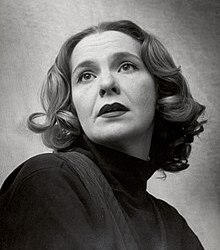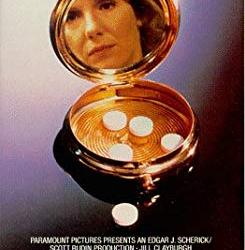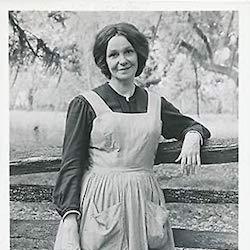#his interrogation with jill is ABSURD
Explore tagged Tumblr posts
Text
I am obsessed with Strahm and I do understand (as a lesbian) that he's a pretty conventionally handsome man but my feelings about him are purely based on the fact that every line delivery is at a 10 hovering on 11, he is so Dennis Reynolds coded to me, he is a man clawing at the hinges, he's approximately 0.2 seconds away from committing murder-suicide at any given moment
#his interrogation with jill is ABSURD#Peter why did you point your GUN at your own HEAD#she was married to JIGSAW and you're the SCARIEST MAN SHE'S EVER MET#he's so extremely straightedge and also so extremely coked up at the same time#lyd posting
10 notes
·
View notes
Text
GERALDINE PAGE: Octopus Lust

In her first lead film role in the John Wayne western Hondo (1953), Geraldine Page takes the space around her physically in a very definite way, but her squinting face and high, persnickety, slightly whiny voice don’t quite have the same authority as her body does yet. She was 29 years old here and already known as a promising theater actress, and she gets a special “introducing” credit for Hondo, for which she was nominated for a best supporting actress Oscar even though she is Wayne’s unconventional leading lady.

“I am fully aware that I am a homely woman,” Page tells Wayne in Hondo, almost boastfully, or at least in a way that seems proud of her own self-awareness. Hers was not a face or even sometimes a sensibility made for the camera, but as a middle-aged and then older woman she made the movies respect her talent. At the Actors Studio in the 1950s, she worked and worked on her thin voice until it became a notably flexible instrument that she could use for practically any effect she wanted.
In a somewhat sparing feature film career, Page would rack up eight Oscar nominations in all, four in the supporting category and four for lead actress, and at least three of her supporting nominations don’t make too much sense. There isn’t much for her to do in Hondo, and she has even less to work with during her jokey short appearances in You’re a Big Boy Now (1966), where she is a cartoon smother mother in an oversized black wig, and Pete ‘n’ Tillie (1972), where she is a society matron in an oversized blonde wig that gets pulled off by Carol Burnett during a low comedy catfight. (Page does have one genuinely funny moment in Pete ‘n’ Tillie where an official asks her age and she gets stuck behind the sounds “For” and “Fi” until she finally collapses, the sort of comic routine that lands precisely because of how overdone it is.)
Page was known for her love of acting, her zeal for it, her lack of shame, and sometimes her lack of control. Critics occasionally chided her mannerisms, the way she strangled words when she was angry or broke them up into separate syllables for hammy emphasis, and as she got older she couldn’t seem to keep her hands off of her face: cupping her cheek, rubbing her eyes, fluttering her hands up and away, almost disconnectedly, from her own deep feelings. She sometimes crosses her eyes slightly when she’s mad but pops them in moments of extreme stress, and she tends to sink into her knees as she walks, as if bright spirits were always being weighed down by worry. Page often falls into physical and vocal grooves and can’t seem to get out of them, and at her worst (and even sometimes at her best) she wallows in peculiarity and freakishness.
She liked food a lot (she called herself “Greedy Gut”), and she made many meals of scenery, too. In the performance that won her a fourth and richly deserved supporting actress Oscar nomination for The Pope of Greenwich Village (1984), Page has only two scenes as former cleaning lady and racing enthusiast Mrs. Ritter, the first of which is a brief interaction with her son. In the second scene, which lasts a show-stopping three minutes and 42 seconds, the police are interrogating Mrs. Ritter about the death of her son. She does not want them to go through his room, and so Mrs. Ritter uses every intimidation and distraction tactic she can think of to keep them out. Page smokes a cigarette here and blows the smoke out of her mouth with a steam engine puff for emphasis, and this isn’t her only prop; she also fingers and kisses a rosary to show her piety and sips from a glass of whisky to show her Irish toughness. Page pours a very broad Noo Yawk accent all over her dialogue and enjoys the outlandish sounds she can make with it, particularly when she says “yoose.”
Page’s Mrs. Ritter looks over and away from the cops but then stares straight at them when she wants to scare them. “My Walter was as tough as a bar of iron…and he didn’t get that from his father,” she warns. In the last 20 seconds of the scene, violins on the soundtrack alert us that she will drop her mask once the police leave, and for about 16 seconds Page shows us Mrs. Ritter’s grief, which is still fairly tough, for this is a woman who exerts control over everything, even her own feelings. Page’s Mrs. Ritter is virtuoso work, like the performance that finally won her a lead Oscar the following year, The Trip to Bountiful, and it is simultaneously absurd and riveting, campy yet also deeply real and imagined.

There is a similar reality to another brief performance she gave at this time that did not get Page an Oscar nomination, her dying poet Jean Scott Martin in I’m Dancing as Fast as I Can (1982), a Jill Clayburgh vehicle about Valium addiction. Page has about twice the time for her Big Scene here as she got for Mrs. Ritter’s Big Scene, and so she really shoots the works and practically shuts the whole movie down with it. A hole seems to open up in the film during this scene and everything else that happens later falls right into it.
Page’s Jean has just watched a documentary Clayburgh’s Barbara has made about her life, and at first she is quietly livid at its sentimentality. But then she begins to tell Barbara off in very profane language, and her anger starts to build and expand, and Page makes the shock of this expansion truly scathing and harrowing, and inescapable. Jean (and Page) can do a lot with words, sticking them like knives and then twisting them, or making them land, explode, and destroy until Clayburgh nearly seems to swoon in response. We see Jean later in the film and she makes up with Barbara, but this doesn’t diminish the intensity of Page’s tirade, or the rage this woman feels about the prospect of dying and then disappearing.
Page had a wide range, but she was typecast when she was young as neurotic spinsters, a trend that began with her performance on stage as Alma Winemiller in Tennessee Williams’s Summer and Smoke in a 1952 production credited with spurring the whole Off-Broadway movement in New York. In the 1950s, Page played on stage with James Dean in The Immoralist and played lovelorn spinster Lizzie Curry in The Rainmaker while making occasional appearances on TV. At 37, she was allowed to play Alma on screen in a 1961 movie version of Summer and Smoke that suffers from the casting of Laurence Harvey as her unappealing leading man and love object.
Page doesn’t let Harvey get in her way in Summer and Smoke, and this is a good case of what might be meant by the word “technique” when it comes to acting. Harvey doesn’t give Page anything at all to work against as a scene partner, but she stays focused and listens and hears what she is supposed to be hearing from him, somehow. She delivers her Alma to the screen with care and tact and occasional sensual detail, helped along by a sensitive score from Elmer Bernstein and the pale blue colors of her clothes, the frozen ground that her Alma retreats across in the penultimate scene, and the florid writing itself.
When she played the faded movie star Alexandra Del Lago on stage in Williams’s Sweet Bird of Youth, Page penciled lines on her face and seems to have emphasized the grotesque and solemn side of the play. But in the 1962 movie version, Page made a crucial adjustment for the screen, steering her part into imperious comedy and doing lots of nutty things with her eyes and with her vocal delivery. The redheaded, egoistic Alexandra is supposed to have been “the sex symbol of America,” and Page almost makes you believe that she was that, but not quite. Daring you to think she is miscast, Page laughs and howls full-throatedly here, always staying highly conscious of her outré effects because Alexandra is conscious of them too, even when (or especially when) she’s drunk or stoned. “The camera doesn’t know how to lie!” Page’s Alexandra cries, but she herself puts the lie to that statement, for this is a risky performance dedicated to tricking the camera, routing it, leading it on a wild goose chase with sinuous poses and emphatic declarations. Everything Page does in the film of Sweet Bird of Youth is primed to make you ask, “Who is that?” or even “What is that?”
This is one of the campiest performances in film history, every word underlined three and sometimes four times in purple ink. Speaking to Paul Newman’s gigolo Chance Wayne, Page’s Alexandra purrs, “Make me almost believe that we are a pair of young lovers…without any shame.” He smiles at that, and it’s easy to smile along with him. Chance in turn amuses her Alexandra, and she is even modestly touched by him, but only modestly, and Page is scrupulous about showing the smallness of that feeling, even when Alexandra is drunkenly calling his name outside their hotel room, each “Chance!” more plummy and piss elegant than the last. Page gives this role an opulent sort of size, festooning it with cheerfully unaccountable and facetious vocal pyrotechnics, but she also somehow grounds it in a recognizable psychological reality, and this balancing act is no small feat.
In her last big scene on the phone in Sweet Bird of Youth, when Alexandra finds out from the columnist Walter Winchell that her latest movie comeback was a success after all, Page overflows with vulnerable yet blissful “I knew it all the time!” nervous relief, and this phone monologue is a real star turn that again is grounded in emotional truthfulness. Page shows that you can go as high, wide, and handsome with over-embroidered acting as you want as long as you have done the work beforehand to make the character real and specific underneath. “Page beautifully intertwines inner steel and insecurity, cannily conceived as two sides of the same coin,” wrote John DiLeo in his 2010 book Tennessee Williams and Company. “Beneath Page’s flourishes of self-centered bravado is the more fragile Alexandra, the woman mired in the indulgences of self-pity and self-gratification.”
Page turned down the role of Martha in the original 1962 theater production of Edward Albee’s Who’s Afraid of Virginia Woolf?, a large mistake on her part. On screen, she played a high-strung spinster with incestuous longings for her brother in a film of Lillian Hellman’s Toys in the Attic (1963), giving the kind of overbearing, headlong performance that doesn’t work well for the camera, though it might have had some power on stage. She was a spinster again in a much softer key for the modest romance Dear Heart (1964), and then she went back to TV to deliver what might be her finest performance of all, the kind and loving Sook in adaptations of the Truman Capote stories A Christmas Memory (1966) and The Thanksgiving Visitor (1967). She won Emmy awards for both.
The remarkable thing about her work in those Capote TV movies is that Page never emphasizes the fact that Sook has the mind of a child, which Capote himself tells us in his narration. She makes Sook mischievous and sly, a good-hearted hedonist like Page herself was, a lover of pretty things and movie stories, and there is never any pathos in her interpretation; she doesn’t underline or show us Sook’s childlikeness but embodies it, a much more difficult thing to achieve than her colorfully overstated yet grounded work as Alexandra Del Lago. In the last scene of A Christmas Memory, when Sook is flying a kite and talking about life and death, Page breathes quietly and totally opens her face up to the camera until a purely soulful expression steals across it, like the sun slowly moving behind clouds, and she lets this happen rather than making it happen, as she does in some of her lesser work.

The Beguiled
On stage she played Olga in the disastrous Actors Studio production of Chekhov’s Three Sisters, and the recording of it shows that she is the only member of the cast who gives an even remotely acceptable performance amid much reckless self-indulgence from the others. She took a rewarding, even daring lead on film in Don Siegel’s The Beguiled (1971), a psychosexual western where she presided over a band of lusty young ladies after the manhood of Clint Eastwood as if she were running her own school for neurotics. Her character is horny for Eastwood but she also has a thing for one of her charges, played by Elizabeth Hartman (at one point she kisses Hartman full on the mouth). After that Page’s career deteriorated for a while to guest shots on TV shows like Night Gallery, The Snoop Sisters and Kojak, where she could be relied on to act up a storm while wearing caftans and frowzy wigs.
But in 1978 Page picked up another lead Oscar nomination for her subversively funny performance as another neurotic in Woody Allen’s Interiors, where she plays Eve, a perfectionist in the domestic sphere who finds herself abandoned by husband and children. In the back of a cab, with her hair pulled back tightly and heavy make-up on her face, Page’s Eve resembles a weary female impersonator. A micro-managing tyrant, Eve descends to grotesque twitches and facial collapse shortly after her husband of many years, Arthur (E.G. Marshall), tells her he is leaving her, but her self-pity and self-destructiveness often retain a kind of physical elegance even in the midst of breakdown.
When Eve attempts suicide after taping up her windows and turning on a gas oven, Page spreads herself out on a divan to await death in an amusingly sulky, almost sexy way. “I have an inner tranquility!” she insists at one point, and the comedy here comes from someone vehemently denying the most obvious reality. When Eve is watching TV by herself and drinking some wine, Page allows her the open face that she gave Sook at the end of A Christmas Memory, because this woman is only free to be like that when she is alone. And Page memorably rises to the grandstanding moment when Eve smashes candles in a church after Arthur squashes her notion of reconciliation for good.
There were small film and TV roles after that, often as exuberantly frumpy women, and these were sometimes little more than bits, but then came the movie she knew would win her that elusive Oscar, The Trip to Bountiful, a 1985 adaptation of a Horton Foote TV play originally done with Lillian Gish, expanded with all the trimmings for Page’s swan song. Her Carrie Watts is a stubborn old woman who runs away to her hometown of Bountiful after living in bickering discontent in a two-room Houston, Texas, apartment with her weak son Ludie (John Heard) and catty daughter-in-law Jessie Mae (Carlin Glynn). Page’s hand-to-face mannerism is out of control here sometimes, but such surface idiosyncrasies do not distract from her inventiveness, her heightened emotions of elation and relief, and the specificity of her performance, the way she can make you see and hear a person from Carrie’s past, as if Page has done extensive back story work for every name Carrie mentions.
Page had a stormy marriage with bad boy actor Rip Torn (the card on the door of their Manhattan townhouse read “Torn Page”) that produced two talented actors, Tony Torn and Angelica Page. In Nazi Hunter: The Beate Klarsfield Story (1986) for TV, Page clearly looks ill and tired, and she died of a heart attack the following year at the age of 62 while playing Madame Arcati on Broadway in Blithe Spirit. At a tribute shortly after her death, Anne Jackson said that Page “used a stage like no one else I’d ever seen. It was like playing tennis with someone who had 26 arms.” And in her best movie work, Page finally made the camera bow to her octopus talent, her greedy, gutsy ardor for acting.
by Dan Callahan
9 notes
·
View notes